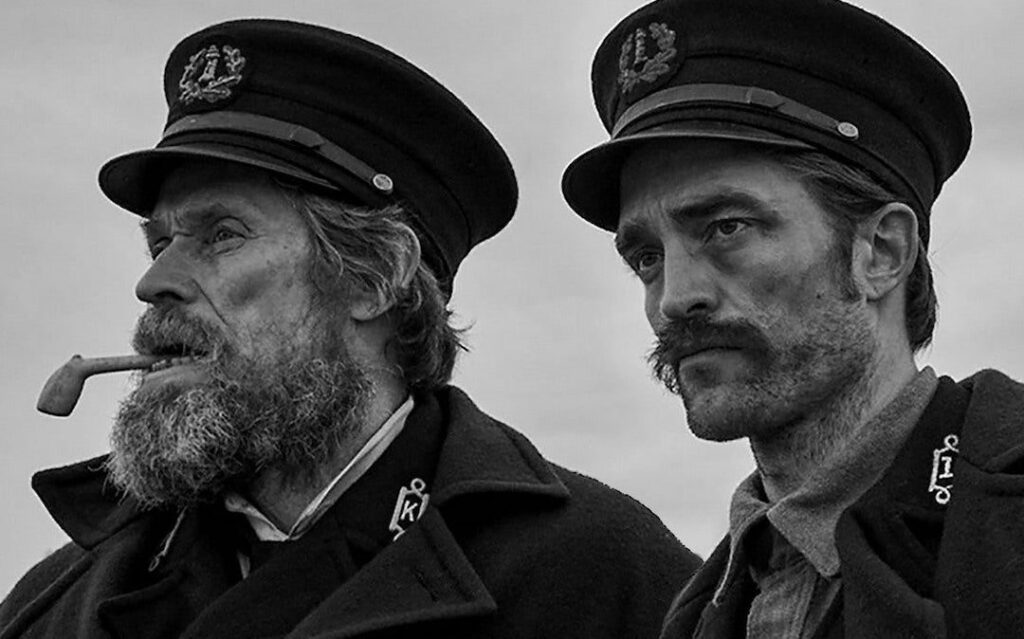In Robert Eggers’ last feature, The Witch, the writer/director showcased his fresh brand of stylized horror with a story that was slow-cooked to perfection until its juices exploded into chaos. The Lighthouse, his latest starring Willem Dafoe and Robert Pattinson, pushes his characters closer to the brink, unraveling their sanity as kaleidoscopic and claustrophobic surroundings threaten to suffocate them. Eggers’ method of storytelling comes preloaded with a creeping sense of unease that stalks his characters like prey and mystifies his audience until the very last frames.
Dafoe and Pattison play two lighthouse keepers working a challenging station in the middle of the ocean off the coast of New England. Dafoe’s Thomas Wake is a demanding veteran of the post, delegating the most physical and grimiest of tasks to Pattinson’s younger Ephraim Winslow. It’s Winslow’s first lighthouse gig; he’s looking for a new beginning while tolerating the difficulties of living with a curt old man. As the duo’s time together nears its end, tensions swing back and forth from drunken camaraderie to flying fists as a terrifying storm threatens the remote island they’re stationed on. That’s when things go from odd to surreal.
Weeks trudge by and the gruntwork and isolation grinds Winslow down. The loss of sleep distorts his reality: he beefs with a one-eyed seagull that seems to hate his existence; he dreams of Wake stripping naked and turning into a grotesque tentacled monster; he discovers an unsettling mermaid strewn on the rocks that he then has sex with. Or is it all a dream? In the midst of the hysteria, he’s forbidden by Wake to climb to the top of the lighthouse. Is the island keeping a secret from Winslow? The paranoia further fuels his insanity as Eggers tightens the screw delivering a mindfuck of events and sheer WTF moments.
The challenge of having a minimal cast is eradicated thanks to the strength of its performers. Dafoe, with his late 19th-century dialect and sailor’s superstitions, is mesmerizing. He’s brutish and guttural, playing up the character’s irritability and intolerance with every muscle in his body. Pattinson more than holds his own. As Winslow begins to let madness (and vodka) take over, he’s a filterless, drunken buffoon acting purely on impulse and panic. The physicality of both actors cannot be understated. When shit hits the fan culminating in knock-down-drag-out battles, both actors become unhinged. Oscars be damned: these were two of the most compelling performances I’ve seen all year.
Written alongside his brother Max, Eggers once again delves into terror with subtlety and style, subverting expectations and conventions. The Lighthouse was shot on 35mm film with vintage lenses and is presented in black and white. It has an approximate aspect ratio of 1.19:1 which makes it nearly square, adding to its already alluring mise en scène. The movie’s sound design is also noteworthy with its jittery, distorted audio that pulsates tension through the speakers. The effects are so manic and scratchy (à la David Lynch’s Eraserhead) that we’re forced into submission when the hysteria and hallucinations build to a breaking point. Eggers’ creation looks and sounds terrific, perfectly complementing the madness of the story it’s spinning.
Everything about The Lighthouse fires on all cylinders from its technical proficiency and approach to the fully-committed performances by its talent. Eggers not only expands his brand here, but pushes the genre to its cinematic limits. In a world full of franchised, big-budget projects swirling about, it’s immensely satisfying to have a visionary filmmaker like Eggers in the mix serving up imagery this daring, competent, and unique. Grade: A




I want to see it,